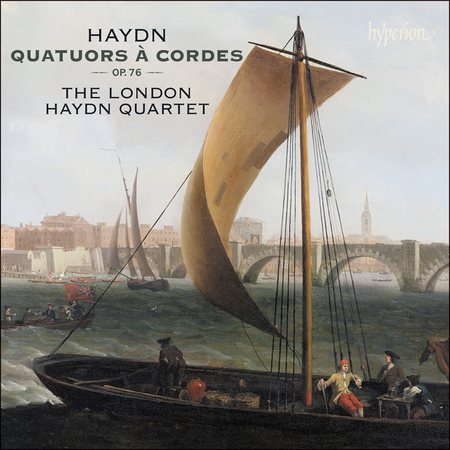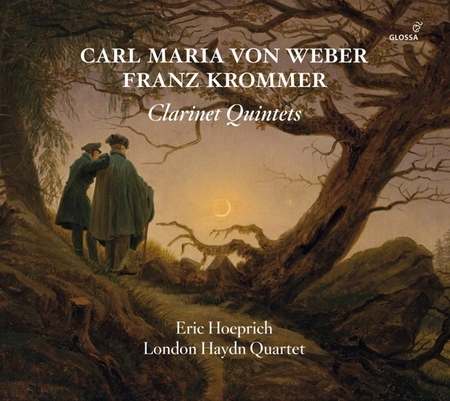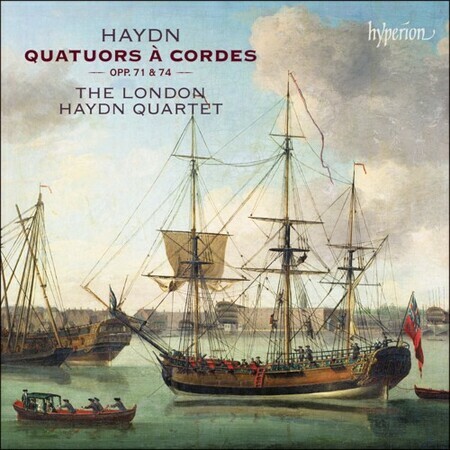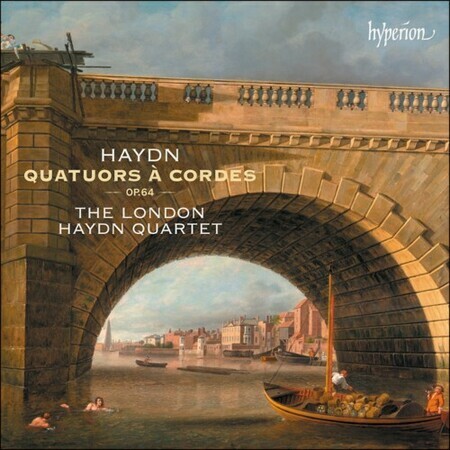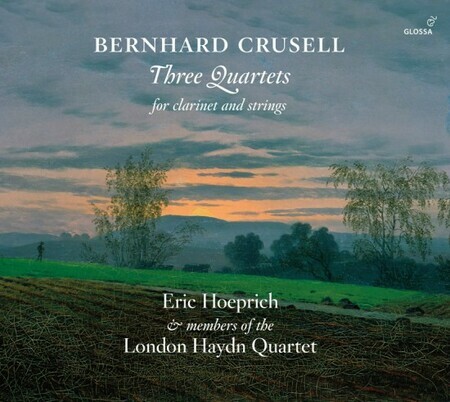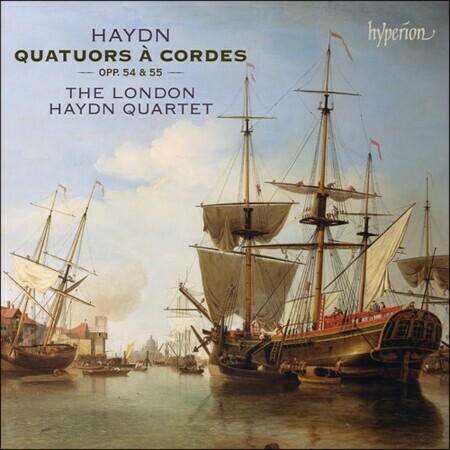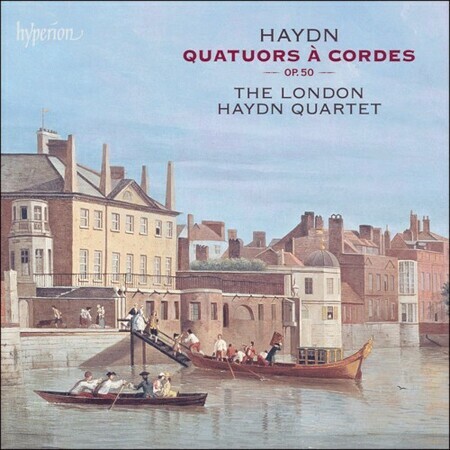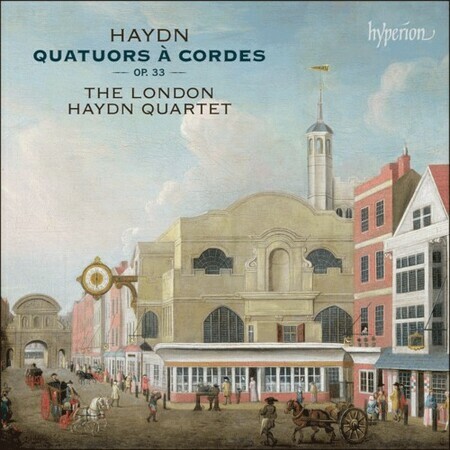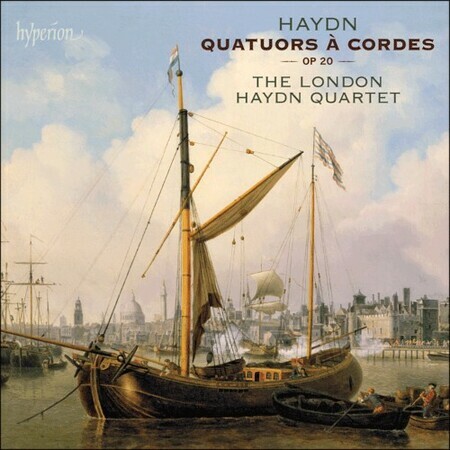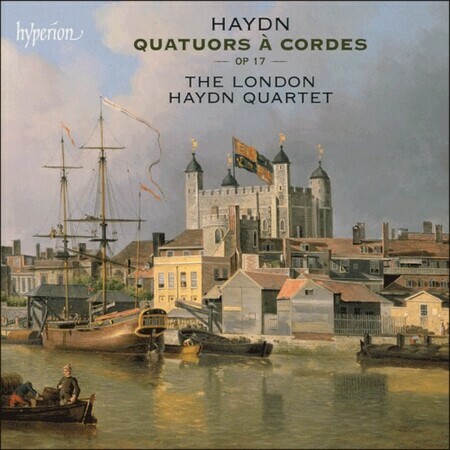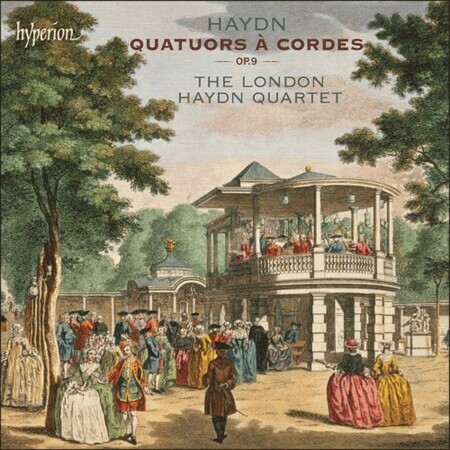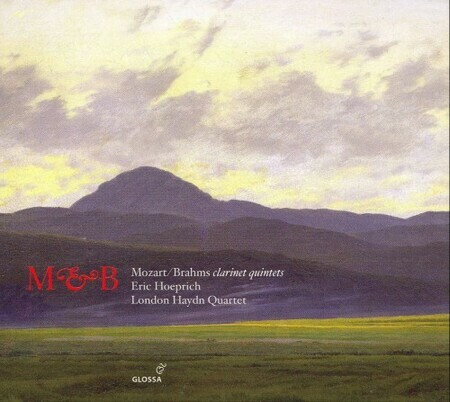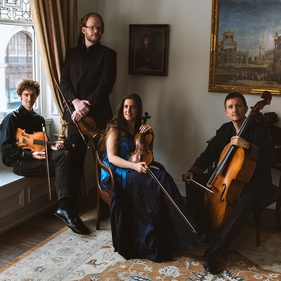Artists · London Haydn Quartet

Catherine Manson - violin
Michael Gurevich - violin
John Crockatt - viola
Jonathan Manson - cello
One of the world’s leading period instrument string quartets, The London Haydn Quartet was born out of a passion for Haydn. they have received invitations to many of the most important concert series in UK, USA, Canada, The Netherlands, Belgium, France, Germany, Spain and Switzerland. The London Haydn Quartet’s series of recordings of Haydn’s quartets on the Hyperion label (the op 9, op 17, op 20, op 33, op 50, op 54/55, op 64 quartets to date) have met with international critical acclaim. Their op 71 & 74 recording is released in October 2019 and op 76 will be recorded in February 2020. The quartet has given recitals of all-Haydn programmes at New York’s Carnegie Hall, the Cheltenham Festival, Utrecht Festival, Bath Mozartfest, Klara Festival the Granada International Festival and at Haydn festivals in Esterhazy, Lincoln and Lyon and the English Haydn Festival.
In collaboration with period clarinettist Eric Hoeprich, with whom they also recorded the Brahms and Mozart quintets and Berhard Crusell's clarinette quartets on the Glossa label, their recent concerts have included a tour of the USA and Canada including a recital at the Library of Congress, and appearances in Serbia, Switzerland, France, Germany, Poland and the Czech Republic.
Recent highlights include the quartet's Australian debut with performances at the Melbourne Festival and the Sydney Opera House and a return to Canada for a series of concerts across the country, a series of five concerts in Germany and a tour in the USA with concerts in Atlanta, Philadelphia, New York, Boston, Milwaukee and finishing at Yale University. In August 2017 the quartet gave a series of five concerts of Haydn and Beethoven quartets at the Berlioz Festival in La Côte-Saint-André and in the autumn toured in Singapore and Japan. In 2019, as well as their numerous concerts in the UK, the quartet has performed at the Concentus Moraviae Festival in the Czech Republic and Świdnica Bach Festival in Poland with Eric Hoeprich. They return to tour the US and Canada in the autumn of 2019.
The London Haydn Quartet's website: http://londonhaydnquartet.co.uk/
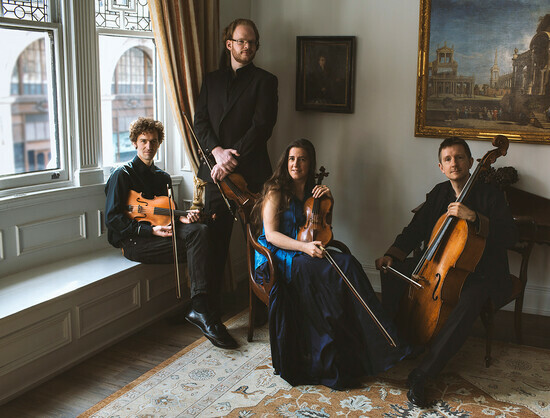
Photo David Brunetti
Press reviews
String Quartets Op 64
'Haydn’s Op 64—along with its predecessors, Op 54 and Op 55—used to be known as the 'Tost' quartets, a nod to the name of the Hungarian to whom the composer allegedly dedicated the set. (He had been leader of the second violins in Haydn’s Esterhazy orchestra.) Tost’s reputation has taken a knocking of late, however, as Haydn removed his name as dedicatee from the publication he personally supervised, and the works are notable—with perhaps the exception of the famous 'Lark' Quartet in D—for their avoidance of the virtuoso first-violin part that dominates Op 54 and Op 55. These are more intimate and integrated works, clearly influenced by Mozart’s 1785 set dedicated to Haydn, and packed with Haydnesque 'surprises'. The 'slow' movement of No 1 is a sprightly allegro scherzando, while the adagios of both the G major and the Lark—subtitled 'cantabile'—are serene, aria-like compositions. The London Haydn Quartet’s chronological survey of the composer’s quartets is nearing its completion: the most civilised music, delivered with immaculate technique, urbane humanity and perfect period manners.'
Hugh Canning, The Sunday Times, November 2018
'From the start, the qualities of the playing are as good as ever … with the sweet, fibrous sound of gut strings, limited application of vibrato, unanimity of phrasing and articulation, and an unerring instinct for tempos: slow movements that sing, soulfully; swift finales, but nothing unmusically fast; and well-pointed minuets and trios. Intimately recorded … but with warmth around that grain and detail.'
BBC Record Review, December 2018
String Quartets Opp 54 & 55
'Haydn String Quartets Op.54 and 55 The London Haydn Quartet (Hyperion) A 1789 playbill for a "professional concert at Hanover Square in London" announced a new set of quartets by Joseph Haydn. The composer's latest quartets, Op.54 and Op.55, three works apiece, were designed to satisfy the hungry demand for his chamber music across Europe. With their virtuoso first violin parts, these are quartets primarily for professional performance and the London Haydn Quartet revel in their brilliance and originality. The edgy sound of period instruments may not appeal to all, but the period ebullience of these performances surely will.'
Richard Fairman, Financial Times, February 2017
'Haydn wrote the six quartets of Opp 54 and 55 in 1788, by now a celebrated composer across Europe and still opera Kapellmeister at Esterházy. These period instrument players, whose very name declares their affinity for Haydn, excel in the latest in their Hyperion series. Ever spry in fast movements, faultless in dexterity and intonation, they find a special warmth of feeling in the slower moments: the songful Adagio Cantabile of Op 55 No 1, the puzzling, melancholy Andante of Op 55 No 2, the dark, hymn-like first bars of Op 54 No 2’s Adagio, out of which the violin soars in almost improvised, bluesy reverie. Too many pleasures to enumerate. Try for yourself.'
Fiona Maddocks, The Guardian, January 2017
'Is there a greater musical treat than sitting down to listen to a new set of Haydn quartets (well, apart from actually playing them)? The London Haydn Quartet’s period-instrument cycle has reached Opp 54 and 55, and with them, some of the richest and most fantastic of the many treasures that await those who venture off the beaten path of Haydn’s nicknamed and late works.
'The London Haydn Quartet engage both head and heart from the very first bar. Take, for example, their sharply characterised opening flourish in Op 54 No 2. It’s part of a larger strategy. Knowing that the gypsy Adagio is something special, they play the opening chorale with a big, throaty vibrato—while violinist Catherine Manson wrings aching portamentos out of her swirling phrases. Yet it’s all, somehow, kept within a logical rhythmic framework—making Haydn’s slow finale feel like the culmination of a single imaginative vision.
'Once again, the LHQ find all this spirit while remaining faithful to the letter of the score (they play from a 1789 edition), and with all repeats observed you get plenty of Haydn for your money. In Hyperion’s bright recorded sound the group’s transparent, mostly vibrato-free tone may initially feel chilly; but bear with it. It pays dividends in Op 54 No 3, where Haydn builds his textures around the middle voices: Manson seems to glint and glitter over the top. And again, in the first movement of Op 55 No 2, where the group applies just the right amount of sugar to Haydn’s F minor pill.
'Not that these players are unduly fixated on form. There are any number of wayside delights, from the LHQ’s deadpan final pay-off in Op 54 No 1 to their spacious phrasing in Op 55 No 3’s Adagio. In short, these performances offer more with each listening. Booklet-notes by Richard Wigmore complete a very handsome package.'
Richard Bratby, Gramophone, January 2017
'Like a glass of prosecco before a more robust wine, Haydn’s sunny string quartets are often served as an appetizer to a weightier work. But theLondon Haydn Quartet has sought to elevate the status of Haydn’s some 75 string quartets, exploring the many neglected gems of his vast catalog.
'A period ensemble that plays on gut strings with classical bows, the group offered a revelatory performance on Tuesday evening at the Morgan Library & Museum’s Gilder Lehrman Hall, presented in tandem with the Boston Early Music Festival.
'The ensemble opened the program with an exquisitely rendered interpretation of Haydn’s infrequently performed String Quartet in B flat (Op. 50, No. 1), written in 1787 and dedicated to the cello-playing king of Prussia. The musicians highlighted the mysterious and brooding character of the first movement, which opens with a questioning cello motif. The earthy, warm sounds of the gut strings blended beautifully throughout.
'The quartet’s deeply committed music making seemed indicative of a longstanding and nourishing partnership, as the physically demonstrative players were acutely alert to their colleagues’ every gesture.
'They brought a more full-bodied sound to the String Quartet in D (Op. 18, No. 3) by Beethoven, who was profoundly influenced by Haydn, often called the father of the string quartet. Like the opening Haydn piece, the Beethoven quartet begins with a few delicate, harmonically ambiguous measures. The work also pays homage to Haydn with the witty, unexpected ending of the concluding Presto, played here with passion and verve.
'The musicians imbued both works with myriad details of shading and contrast, and beautifully calibrated phrasing. Barring a few tiny slips, they played with impressive intonation throughout the concert.
'They were joined by the clarinetist Eric Hoeprich for Mozart’s Clarinet Quintet in A (K. 581). Mr. Hoeprich’s rounded, mellow tone meshed alluringly with the warm sound of the gut strings. The second movement Larghetto, one of Mozart’s most sublime creations, sounded hauntingly lovely.'
New York Times,
January 22, 2014, Concert at the Morgan Library, New York, presented by the Boston Early Music Festival
‘Newly revised and corrected’ is how Artaria proudly announced its 1801 edition of these quartets. Exciting? Not for all scholars today. ‘The editorial approach is heavy-handed, transforming Haydn’s highly articulated style by the addition of ‘convenient’ slurred bowings and numerous extra dynamic markings’, protests Simon Rowland-Jones (Edition Peters). Poor old Haydn; he had personally made the changes.
'The London Haydn Quartet, playing period instruments, accept them unreservedly. As may have Donald Tovey, who said, ‘Not even Op 76 is, on its own plane, so uniformly weighty and so varied in substance as Op 20.’ Now an ensemble, unique in collective insight, in tempo-management, articulation of melodic design and assessment of harmonic weight, unfolds the substance. Mostly unconventionally. The first movement of No 3 might jolt, nowhere nearAllegro con spirito. The phrases slowed down are dislocated – and disturbing. Passionate fervour dominates the C minor Capriccio of No 2, warmed by the lyrically moving E flat middle section. Add strange intimations of a threnody in the Minuet of No 5, the adroit zip of thePresto scherzando in No 4, the soft undertones in the fugal finales, sombre in No 5, bright in No 6, and there is simply nothing to support Rowland-Jones’s bewildering assertion that ‘a noticeable lack of character and rhythmic vitality results from following Artaria’s readings’.
'Noticeable instead is the singularity of readings from artists who stake a claim on Artaria’s edition; and ignoring preconceived notions courageously accept responsibility for provocative interpretations – of enthralling magnitude.'
Gramophone, October 2011, Nalen Anthoni
'The rich sonorities of the second movement of no. 1 and the overall emotional ardour - as in the second movement of no. 2 - makes these a very fine set of performances, intelligently phrased and sensitiviely recorded. Some of the best Haydn I have heard in a long time.'
The Strad, November 2011, Haydn String Quartets op. 20, Hyperion records
'Every string quartet worth its rosin plays Haydn. None, though, plays Haydn like the London Haydn Quartet. Where others treat the Classical-period master with deference, these accomplished musicians — violinists Catherine Manson and Michael Gurevich, violist James Boyd, and cellist Richard Lester — have devoted themselves to him wholeheartedly, fulfilling a mission to boost the profile of his vast output for their ensemble. Two hundred years after Haydn’s death, they’re still giving local premieres. In a rare U.S. appearance Sunday on the “Chapel, Court & Countryside” series in Harkness Chapel at Case Western Reserve University, the quartet offered a deeply nourishing sampling of Haydn’s quartets. Listening to three works on their period-style instruments, with the cello and viola seated at the rear, one savored not just the music’s formal perfection but also its humor, lyricism and emotional depth. The first evidence of their intimate knowledge of Haydn came in the A-Major Quartet, Op. 9, No. 6, an early work thought to be a simple entertainment. But if they were considering a lightweight score, there was nothing trifling about their performance. Rather than hang statically, long notes pulsed in glowing arcs. Virtuoso passages sizzled, and familiar themes, draped in fresh dynamics, took on new character with each reappearance. The central Adagio was an absorbing journey on which the road grew steadily darker. Representing the so-called “Sun” quartets was Op. 20, No. 2, a masterful work featuring unusual compositional devices such as unison statements and a weighty slow movement situated early in the piece and linked organically to the Menuet. Living up to Manson’s promise of a quasi-operatic scene, the Adagio as performed by London was a wrenching musical episode, full of startling outbursts, agonized cries, and a dramatic cello line hauntingly enunciated by Lester. From there, the quartet launched without a second thought into the concluding fugue, wielding a singular blend of individual independence and collective unanimity. Before a substantial encore, the London players finished off with the last quartet Haydn completed, Op. 77, No. 2, from 1799. On the program Sunday, it was perhaps the best-known entry. We were treated to a flawless Allegro, featuring an especially vigorous development. Even more fun was the Menuet, whose steep musical hills and valleys the quartet treated to exhilarating surges. But the highlight was the Andante; No other group could hope to render its long-spun melody more purely or smoothly. Coming from the London Haydn Quartet, it was definitive proof that it pays to specialize.'
The Plain Dealer, Cleveland, March 2010, Zachary Lewis
'I quickly warmed to the pure, glowing sound of gut string played perfectly in tune, and to the ensemble's delicacy of nuance and sensitivity to harmonic colour, treating the listener as privileged eavesdropper.'
Gramophone, December 2007, Haydn String Quartets op. 9, Hyperion records
'Without doubt one of the all-time great Haydn quartet recordings.'
Classic FM, December 2007, Haydn String Quartets op. 9, Hyperion records
'A set to bring long-lasting pleasure.'
The Times, June 2009, Haydn String Quartets op. 17, Hyperion records
'The London Haydn Quartet, whose recording of the Op.9 set on Hyperion has already been widely praised, play on gut string with classical bows. Those who want a 'period' performance should not hesitate; they are unlikely to hear any better of its kind. Articulation is light, precise yet full of nuance; vibrato is scarcely detectable yes intonation is immaculate; the whole texture shines.'
BBC Music Magazine, October 2009, Haydn String Quartets op. 9, Hyperion records
'The London Haydn Quartet played an all-Mozart program that was virtually detonating with musicianship and fresh ideas.'
The Washington Post, Concert at the Library of Congress, May 2006
'These refined performances profile the music's conversational sophistication and its sheer fluency, underscoring Haydn gift for civility and wit.'
Financial Times, July 2013, Haydn String Quartets op. 33, Hyperion records
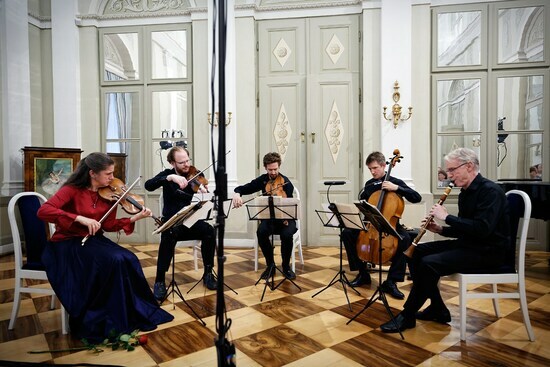
At the Concentus Moraviae Festival with Eric Hoeprich, June 2019. Photo Adam Dušek
Programmes
In 2021 and 2022 the London Haydn Quartet's programmes will be giving priority to Haydn's late quartets, the opus 71 & 74, released in October 2019, opus 76, released in January 2021, and the programme of the final album in their Haydn Quartet cycle for Hyperion Records, opus 77, opus 102 and opus 42. Also available in the 2021-2022 season are Bernhard Henrik Crusell's clarinet quartets with Eric Hoeprich (Diapason d'Or, October 2017) as well as Weber and Krommer's clarinet quintettes, also to be released on the Glossa label in 2020. The London Haydn Quartet regularly performs Beethoven's opus 18, 74 & 95 as well as numerous Mozart quartets, and of course Mozart's clarinet quintet with Eric Hoeprich.
The London Haydn Quartet has performed all of Haydn's string quartets and there are many ways to compose exciting programmes of Haydn's string quartets. The Quartet's ideas include:
• A chronological selection showing development from the early divertimentos (Op.1) to Haydn's final re-invention of the medium (Op.77). This would be most effective through a concert series. For example, in three concerts the quartet could offer one work from each set:
Concert 1 - Op.1, Op.9, Op.17, Op.20
Concert 2 - Op.33, Op.50, Op.54/55
Concert 3 - Op.64, Op.71/74, Op.76/77
• There are 42 Haydn quartets that Hans Keller suggests are "masterpieces". These could be arranged into 14 programmes (see below), either for individual concerts or to make series of concerts. Programmes could be chosen to be most musically satisfying. For example, to take into account aspects such as key relationships between works, sonorities, and chronology. In the suggestions below sometimes these are contrasted; for example, 64.1 C major - 50.4 F sharp minor - 76.5 D major, where the F sharp work will sound strange after C major and the D major work following has a very famous F sharp slow movement.
Suggested concert programmes:
54.1 G major
9.4 D minor
77.2 F major
33.6 D major
64.2 B flat major
76.1 G major
64.4 G major
20.2 C major
76.6 E flat major
50.6 D major
64.3 B flat major
71.3 E flat major
33.2 E flat major
76.4 B flat major
55.2 F minor
33.3 C major
20.1 E flat major
64.5 D major
33.5 G major
55.3 B flat major
76.2 D minor
50.5 F major
42 D minor
77.1 G major
55.1 A major
20.4 D major
74.3 G major
64.1 C major
50.4 F sharp minor
76.5 D major
50.3 E flat major
33.1 B flat major
71.2 D major
50.1 B flat major
20.5 F minor
76.3 C major
20.6 A major
64.6 E flat major
54.3 E major
71.1 B flat major
20.3 G minor
54.2 C major
• Alternatively, the complete series of quartets (i.e. 57 quartets + "Seven Last Words") could be presented in approximatly 19 concerts
• The London Haydn Quartet is also keen to present more rarely played works that they feel should be better known! These include Op.9 and 17 as well as many from Op 50 and 64.
• Programmes could be designed to illustrate particular themes. For example "Haydn in London"; this would comprise works either written for or composed in London.
• Complete sets. With a two concert series it is possible to play a complete set. It is fascinating to see how even with works composed around the same time there are enormous contrasts. Sets that work well played together include Op.20, Op.33, and Op.50.
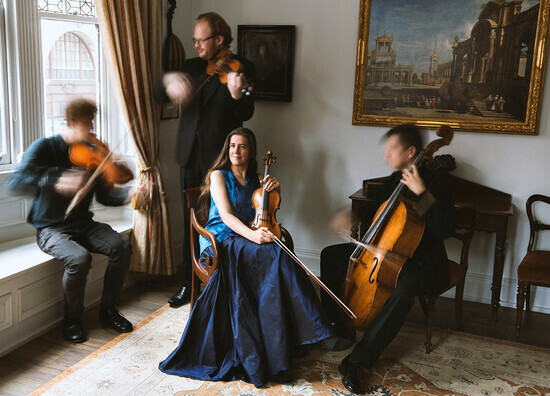
Photo David Brunetti
Recordings

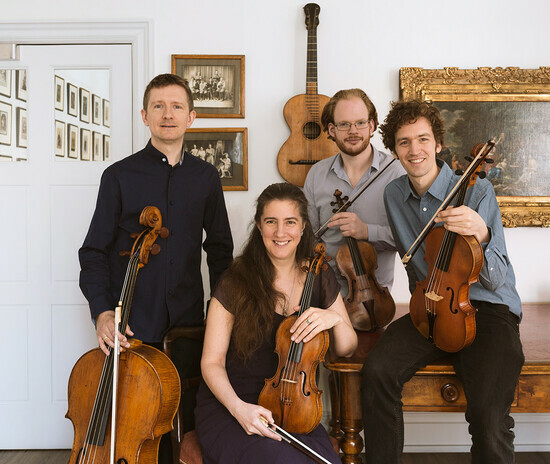
Photo David Brunetti
